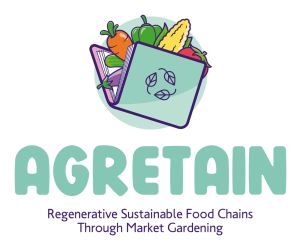
AGRETAIN - Transforming Market Gardening Education with Cross-Sectoral Expertise and Community Engagement:
ERASMUS-EDU-2024-PI-ALL-INNO
Farming in EU is essential to livelihoods and local development while facing many challenges such as limited resources and growing environmental challenges posed by climate change and the related impact of human activity.
Market Gardening could be a solution towards this problem by revisiting reliable traditional methods of agricultural production improved through decades of advancement and combined with modern techniques. It constitutes a bio-intensive method that focuses on the environment, farmers’ well-being and income whilst promoting rural development and sustainability through the efficient use of small areas of land. The Market Gardening model ideally combines European rural development policies with effective responses to current energy and food challenges. It enhances scientific self-sufficiency while reducing energy requirements and increasing employment.
For the successful application of market gardening further support is needed for the workforce, more knowledge about the impact of this business model, more awareness raising and involvement of a wider range of actors.
Training in market gardening is still absent in the majority of EU countries since this model requires a combination of skills and competences that HEIs/ VET centers/ Schools haven’t included yet in their curricula and trainings, demanding multidisciplinary, managerial, and cross-sectoral expertise. Higher education and vocational training could play a critical role in this transition integrating dedicated curricula and trainings linked with specific credits via micro credential system.
To help train and educate the new generation and farmers to possess the necessary hard and soft skills (including technical, economic and regulatory knowledge) which are required by the current and future European Market Gardening trends, we need also to rethink & improve our current Vocational Education & Training (VET) model. This is the long-term ambition of AGRETAIN. To that end AGRETAIN develops a training approach that brings together the worlds of
a) higher education (HE) and research,
b) vocational education and training (VET) and
c) farming business
providing a new adapted education/training curriculum, training material, innovative training methodologies in order to bridge the skills gaps related to market gardening practitioners.
AGRETAIN project aims to develop and deliver an innovative approach for teaching market gardening, by developing specific learning resources addressing
- students,
- neo farmers and
- farming practitioners.
AGRETAIN will deliver a training needs’ analysis and develop a curriculum in the field for students, neo farmers and farming practitioners, exploring the key areas which are critical for the implementation of this innovative gardening business model.
Based on this knowledge, AGRETAIN will design and pilot learning units which will incorporate a mix of training methodologies.
An e-learning platform will offer accessible resources.
AGRETAIN, is an initiative coordinated by the Technological University of the Shannon in Ireland, represents a collaborative effort across five European countries: Ireland, Greece, Germany, Austria, and France aiming to develop and deliver an innovative approach for teaching market gardening. This project is financed under the Erasmus+ program, specifically within the framework of "Partnerships for Innovation - Alliances (ERASMUS-EDU-2024-PI-ALL-INNO)," bearing the project number 101140260. Olympic Training is one of the three partners from Greece.
Learn more by visiting the project webiste and social media pages on LinkedIn and Facebook

Views and opinions expressed are those of the author(s) only and do not necessarily reflect those of the European Union or the European Education and Culture Executive Agency (EACEA). Neither the European Union nor EACEA can be held responsible for them



